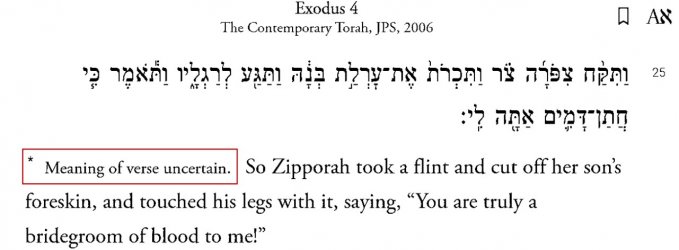Exodus 4:24
At a night encampment on the way, Yahweh encountered him (Moses) and sought to kill him.

Yahweh attacked Moses to kill him!
The ancient Jewish scholars who translated the Bible into the Greek language (the Septuagint), rendered the word “Yahweh” as “Angel / messenger of the Lord”.
24 εγένετο δε εν τη οδώ εν τω καταλύματι συνήντησεν αυτώ άγγελος Κυρίου (Angel / messenger of the Lord) και εζήτει αυτόν αποκτείναι.
Obviously, they could not endorse the fact that Yahweh was attempting murder. Especially against Moses, who was on a mission under Yahweh’s command (to get the Israelites out of Egypt and towards the land of Canaan).
The author of this passage was not a theologian. He had a message to convey and did not care much about Yahweh’s reputation.
Exodus 4:25
So Zipporah (Moses’ wife) took a flint and cut off her son’s foreskin, and touched his legs with it, saying, “You are truly a bridegroom of blood to me!”

Zipporah circumcised her son because she understood that it was what Yahweh wanted.
It was Yahweh whom she called “bridegroom of blood” and it was to his legs that she touched the foreskin. A gesture pointing to the one who caused the bloodshed.
As you see in the comment above, “Meaning of verse uncertain”, the passage is to this day incomprehensible to the modern translators of the Jewish Publishing society.
As regards the ancient Jewish translators, they wrote in their Greek translation that Zipporah threw herself to the feet of him (Yahweh) instead of touching his legs with the foreskin, and they altered her words “You are truly a bridegroom of blood to me!” to read “It is the blood of the circumcision of my child”.
25 και λαβούσα Σεπφώρα ψήφον περιέτεμε την ακροβυστίαν του υιού αυτής και προσέπεσε προς τους πόδας αυτού (threw herself to his feet) και είπεν (and said)· έστη το αίμα της περιτομής του παιδίου μου (“It is the blood of the circumcision of my child”).
According to the Biblehub.com translation, Zipporah touched the legs of Moses with the foreskin.

Exodus 4:26
And when [God] let him (Moses) alone, she added, “A bridegroom of blood because of the circumcision

In the Greek translation, the words “A bridegroom of blood because of the circumcision.” have been altered to read “It is the blood of the circumcision of my child”.
26 και απήλθεν απ’ αυτου, διότι είπεν· έστη το αίμα της περιτομής του παιδίου μου (“It is the blood of the circumcision of my child”).
The phrase “bridegroom of blood”, which was omitted in the Greek translation, was addressed to Yahweh (which is the reason for the omission), and it is “Bridegroom” because Yahweh fathered the child, and “of blood” because of the circumcision.
Yahweh attacked Moses because he thought that Moses was the father of the child (instead of himself). Zipporah, by circumcising the child proved that the child was a son of God. Yahweh was persuaded and let go of Moses.
The message that the author of the passage wanted to transmit was that circumcision proved that the circumcised was a son of God.
To the ancient Israelites, Yahweh was a common Bull-god like all other gods.
There is a famous papyrus, namely Papyrus “Amherst 63”, that took 120 years to be deciphered because the text, known as “The Aramaic Text in Demotic script”, is written in the Egyptian demotic script, but the language is Aramaic.
A priest of an Aramaic-speaking community in Upper Egypt dictated the liturgy of the New Year’s festival to an Egyptian scribe. The papyrus was discovered at Luxor (ancient Thebes) and the handwriting dates the manuscript to the fourth century BCE. In the text appear gods of the Hebrew, the Egyptian, the Sumerian, the Babylonian, and the Assyrian pantheons.
According to the translator, Richard C. Steiner “The chief gods of the community are referred to as mr “lord” and mrh “lady”. These epithets are rendered as Mar and Marah”.
In the following passage, the term “Lord” appears as Mar, Horus, and Yahweh. Irrespective of the particular name, the lord is called a Bull:


In the Aramaic Text in Demotic script, what has been recorded are the popular sentiments of the ancient Israelites towards Yahweh free of theological embellishments. Yahweh was a rapist, but he was still their creator, their Bull.
Theologians rejected the rapist part and kept only the creator part of the identity of Yahwe. It appears that to the author of the Exodus passage being studied, Yahweh was still the rapist creator and he did not mind, or even did not like, what clergy and theologians were preaching.
At a night encampment on the way, Yahweh encountered him (Moses) and sought to kill him.

Yahweh attacked Moses to kill him!
The ancient Jewish scholars who translated the Bible into the Greek language (the Septuagint), rendered the word “Yahweh” as “Angel / messenger of the Lord”.
24 εγένετο δε εν τη οδώ εν τω καταλύματι συνήντησεν αυτώ άγγελος Κυρίου (Angel / messenger of the Lord) και εζήτει αυτόν αποκτείναι.
Obviously, they could not endorse the fact that Yahweh was attempting murder. Especially against Moses, who was on a mission under Yahweh’s command (to get the Israelites out of Egypt and towards the land of Canaan).
The author of this passage was not a theologian. He had a message to convey and did not care much about Yahweh’s reputation.
Exodus 4:25
So Zipporah (Moses’ wife) took a flint and cut off her son’s foreskin, and touched his legs with it, saying, “You are truly a bridegroom of blood to me!”

Zipporah circumcised her son because she understood that it was what Yahweh wanted.
It was Yahweh whom she called “bridegroom of blood” and it was to his legs that she touched the foreskin. A gesture pointing to the one who caused the bloodshed.
As you see in the comment above, “Meaning of verse uncertain”, the passage is to this day incomprehensible to the modern translators of the Jewish Publishing society.
As regards the ancient Jewish translators, they wrote in their Greek translation that Zipporah threw herself to the feet of him (Yahweh) instead of touching his legs with the foreskin, and they altered her words “You are truly a bridegroom of blood to me!” to read “It is the blood of the circumcision of my child”.
25 και λαβούσα Σεπφώρα ψήφον περιέτεμε την ακροβυστίαν του υιού αυτής και προσέπεσε προς τους πόδας αυτού (threw herself to his feet) και είπεν (and said)· έστη το αίμα της περιτομής του παιδίου μου (“It is the blood of the circumcision of my child”).
According to the Biblehub.com translation, Zipporah touched the legs of Moses with the foreskin.

Exodus 4:26
And when [God] let him (Moses) alone, she added, “A bridegroom of blood because of the circumcision

In the Greek translation, the words “A bridegroom of blood because of the circumcision.” have been altered to read “It is the blood of the circumcision of my child”.
26 και απήλθεν απ’ αυτου, διότι είπεν· έστη το αίμα της περιτομής του παιδίου μου (“It is the blood of the circumcision of my child”).
The phrase “bridegroom of blood”, which was omitted in the Greek translation, was addressed to Yahweh (which is the reason for the omission), and it is “Bridegroom” because Yahweh fathered the child, and “of blood” because of the circumcision.
Yahweh attacked Moses because he thought that Moses was the father of the child (instead of himself). Zipporah, by circumcising the child proved that the child was a son of God. Yahweh was persuaded and let go of Moses.
The message that the author of the passage wanted to transmit was that circumcision proved that the circumcised was a son of God.
To the ancient Israelites, Yahweh was a common Bull-god like all other gods.
There is a famous papyrus, namely Papyrus “Amherst 63”, that took 120 years to be deciphered because the text, known as “The Aramaic Text in Demotic script”, is written in the Egyptian demotic script, but the language is Aramaic.
A priest of an Aramaic-speaking community in Upper Egypt dictated the liturgy of the New Year’s festival to an Egyptian scribe. The papyrus was discovered at Luxor (ancient Thebes) and the handwriting dates the manuscript to the fourth century BCE. In the text appear gods of the Hebrew, the Egyptian, the Sumerian, the Babylonian, and the Assyrian pantheons.
According to the translator, Richard C. Steiner “The chief gods of the community are referred to as mr “lord” and mrh “lady”. These epithets are rendered as Mar and Marah”.
In the following passage, the term “Lord” appears as Mar, Horus, and Yahweh. Irrespective of the particular name, the lord is called a Bull:


In the Aramaic Text in Demotic script, what has been recorded are the popular sentiments of the ancient Israelites towards Yahweh free of theological embellishments. Yahweh was a rapist, but he was still their creator, their Bull.
Theologians rejected the rapist part and kept only the creator part of the identity of Yahwe. It appears that to the author of the Exodus passage being studied, Yahweh was still the rapist creator and he did not mind, or even did not like, what clergy and theologians were preaching.


